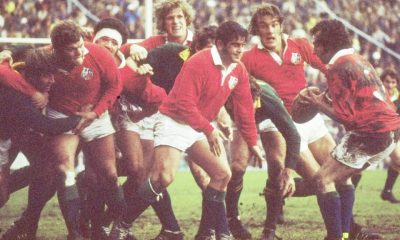
 The hierarchy of the Welsh Rugby Union could have been excused for heaving a collective sigh of relief last Wednesday evening. Flight QF8002 had climbed into the blue yonder above a cloudless Heathrow carrying a passenger list which included their former chief executive who had spent the last four months drumming up support for a palace revolution.
The hierarchy of the Welsh Rugby Union could have been excused for heaving a collective sigh of relief last Wednesday evening. Flight QF8002 had climbed into the blue yonder above a cloudless Heathrow carrying a passenger list which included their former chief executive who had spent the last four months drumming up support for a palace revolution.
David Moffett marked his departure by paraphrasing one of the best known quotes from the Second World War. “I shall return,” he said, borrowing General Douglas McArthur’s words when the American took enforced leave of the Philippines during the Pacific war against the Japanese. “The fight goes on.”
Back at what Moffett calls ‘The Kremlin’, they will have stopped short of popping the champagne if only because trying to ignore a thorn in their side since the turn of the year is not much cause for celebration. They have not seen the last of their bête noire, not by a long shot.
Now is the time for both sides to take stock. As for the WRU, well, chairman David Pickering and chief executive Roger Lewis can look forward to a week when, for once, they will not be challenged, chivvied, cajoled or coerced into joining Moffett in a public debate.
As for Moffett, he has done a whole lot more than rattle the cages of those in high places. He has instigated a national debate into the ‘rotten’ state of Welsh rugby and succeeded despite certain apologists for the WRU doing their best to deny him publicity.
For that alone, he is to be congratulated. Those who have not forgiven him for sacrificing clubs like Pontypridd on the altar of regional rugby eleven years ago, and probably never will, may be happy to see the back of him for the time being but even they ought to have some grudging respect for the man.
The last four months have been without precedent in rugby politics. Nobody had ever given up that amount of their time to run a campaign 12,000 miles away with not much more than an outside chance of achieving the major objective, to become chairman of the WRU.
Like him or loathe him, he confronted the issues in typical Moffett style – head-on. He bought a hard hat and made it a priority to venture into the lion’s den, standing on the terraces at Sardis Road, introducing himself to the fans, defending himself in the face of their anger.
Wherever he went, to clubs all over Wales including Aberystwyth the night before flying home, Moffett strapped himself up and rolled with the punches. There were other times when he landed some telling ones of his own, most notably over his ‘expose’ of the WRU’s finances, claiming they were sitting on reserves in excess of £11m while presiding over an impoverished club game.
The Union described Moffett’s report as ‘scurrilous’ but have since made no public statement as to their financial position. They could, of course, have neutered Moffett’s entire campaign by ending their conflict with the regions instead of effectively driving them into the arms of the English clubs at a time when the Aviva Twelve were in desperate need of an ally.
As I pointed out in this column before, the clubs could never have achieved their victory in Europe without the unwitting assistance of the WRU, a direct consequence of their threat to liquidate any region failing to re-sign their ‘Participation Agreement’ with the Union.
In confronting some harsh realities, Moffett has offered a constructive alternative as published in his One Wales manifesto. His fate rests now with the WRU’s 320 clubs supporting or rejecting his call for an EGM.
They have until May 17 to make up their mind. How many, or how few, will determine whether Moffett spends the next three years running the WRU or looking after his sheep and horses in New Zealand.

1 Comment
You must be logged in to post a comment Login
Leave a Reply
Cancel reply
Leave a Reply
You must be logged in to post a comment.




























Pingback: Webb Schools Free Palestine